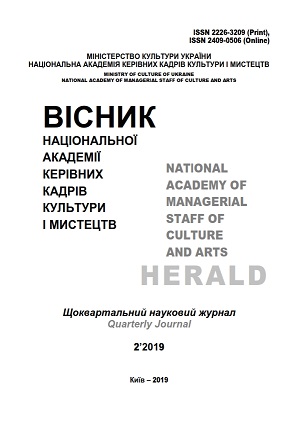Musical and Instrumental Foundations of Modern Composition Techniques
Musical and Instrumental Foundations of Modern Composition Techniques
Author(s): Alla Dmitrivna ChernoivanenkoSubject(s): Music, Aesthetics, Culture and social structure , Sociology of Culture, Sociology of Art
Published by: Національна академія керівних кадрів культури і мистецтв
Keywords: musical instrument; musical instrumentalism; modern composition techniques; aleatory; sonoristics; musical thinking; sound; sound tools; texture;
Summary/Abstract: The purpose of the work is to analyze the instrumental nature of modern composition techniques in the unity of their cognitive (performing and composing) and instrumental and sound parameters. The methodology of the research consists in application of aesthetic-cultural, comparative, theoretical and historical methods, as well as the analytical approach, which form a unified methodological basis. The scientific novelty of the work consists in expanding the notions about the genesis of musical art basing on the analysis of relations of the musical and instrumental principles and the nature of modern composition techniques. Conclusions. Instrumental nature of modern composition techniques is determined by the ongoing processes of individualization of composer's work in the areas of the author's vision of sound material, the relation to musical text, musical chronotopes, musical language, timbres, texture, shaping, etc. The factor of marginal diversity, technical complexity, and often the impossibility of the vocal embodiment of the sound material of compositions – not only sonorist, pointillist, aleatory, timbral-characteristic, etc., but also extramelodic (with a higher order melody consisting not of individual tones, but of the whole texture, when the entire texture becomes a melody) directly demonstrates the instrumental nature of the technique, reproduced in genres of music - mainly without the use of voices or their use in "unvocal", an instrumental sound format, often with the nonverbal meaning. Finally, the very musical thinking in modern composition techniques acquires the qualities of instrumentalization.
Journal: Вісник Національної академії керівних кадрів культури і мистецтв
- Issue Year: 2019
- Issue No: 2
- Page Range: 444-448
- Page Count: 5
- Language: English

